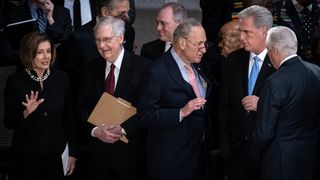The US Congress wields considerable influence over US engagement with the world. Though US foreign policy is primarily directed from the White House, it is Congress that has oversight and final approval of a range of key policies, including international treaties, departmental budgets for defence and diplomacy, and trade agreements. While politics may nominally stop at the water's edge, intensifying polarisation between the Republican and Democratic Parties will be an operational reality for the 118th Congress.
A hostile Congress would have significant implications for the speed and scale at which the Biden administration pursues key foreign policy priorities, including military support for Ukraine, competition with China, trade and technology statecraft, and climate change. To be sure, bipartisanship is not doomed on every issue. But with the Republican Party expected to take control of the House of Representatives and the likely makeup of the Senate still uncertain, the Biden administration may face an uphill battle in pursuing components of its foreign and security policy objectives for the rest of its first term. This explainer discusses how the upcoming 2022 midterm elections are likely to lead to more conditional congressional support for Biden administration requests for Ukraine funding, more escalatory legislative proposals regarding Taiwan, pushback on the Biden administration's trade cooperation efforts, and increased framing of climate change through the lens of strategic competition.
Support for Ukraine
To date, US lawmakers across the aisle have been united in their support for Ukraine’s defence and, more recently, counter-offensives against Russia’s invasion. Voting records on the three major Ukraine aid packages passed this year indicate that support has been more bipartisan than reporting suggests. In both the House and the Senate, Republican opposition has been strongest when aid packages were embedded in more expansive government funding legislation. The rationale for Republican opposition has ranged from insufficient oversight and perceived shortfalls in the amount or type of military aid on offer, to arguments that the money would be better spent on Southern border security, hurricane relief, or countering China in the Indo-Pacific. However, when supplemental aid packages have been proposed as stand-alone legislation, Republican opposition has been low.
A Republican-controlled Congress is likely to continue to support Ukraine but may take a different approach to its prioritisation relative to other challenges. Indeed, should the Republicans retake the House, commentators and leading House GOP figures alike have warned that pockets of opposition within the party may find ways to frustrate otherwise broad consensus on economic and military aid to Ukraine. Prospective Republican House speaker Kevin McCarthy (R-CA) anticipates as much, and is likely to face the same challenges that beset former speakers John Boehner and Paul Ryan in controlling an increasingly vocal minority in the party opposed to issuing a “blank check” for such funding. In this context, the size, substance, and longevity of future US commitments to Ukraine in a Republican-led Congress are somewhat uncertain. Subsequently, President Biden has said that he is “worried” about the future of aid to Ukraine should Republicans secure a majority in the midterms.
Party support for Ukraine aid packages in USD, 2022
| Title/date | Total bill spending | Funding for Ukraine | House vote | Senate vote | Yes/no split |
| FY22 budget, March 11 | $1.5 trillion | $13.6 billion | Foreign Policy: 361-69 |
68-31 | House: 292/89 Senate: 37 |
| Supplementary Ukraine aid, May 21 | $40 billion | $40 billion | 368-57 | 86-11 | House: 311 Senate: 75 |
| Continuing resolution, September 30 | Government spending largely maintained at present levels | $12.3 billion | 230-201 | 72-25 | House: 29 Senate: 47 |
The Biden administration’s near-term capacity to fund the Ukrainian war effort is secured until mid-December 2022 by the September continuing resolution. However, the outlook beyond December is less certain. Though most Americans support US assistance to Ukraine, polling attests that support is weaker among Republicans. Pew Research Center polling from September shows that, though most Americans continue to support US assistance to Ukraine, Republican voters are becoming more likely to see the United States as providing too much aid to Ukraine rather than too little. Over the course of the conflict, concerns about declining congressional and public support for Kyiv have seemingly been staved off by successful Ukrainian offensives against Russian-held positions. However, with the conflict expected to fall into a holding pattern over the European winter, bipartisan support could wane in the absence of clear and verifiable gains.
Strategic competition with China
China policy is another area where there is little daylight between most Democrats and Republicans, something that’s unlikely to change even with a power shift in Congress. Senior Republicans across several key Senate and House committees have vowed to maintain a “laser focus” on pressing China-related issues, including cyber threats, export controls and supply chain diversification, space competition, and military and diplomatic support for Taiwan. Indeed, there is strong bipartisan support in the Senate for a China Grand Strategy Commission, which would, over two years, develop a whole-of-government approach to guide Washington’s relationship with Beijing. Such bipartisanship will likely be encouraged following the first reports of Chinese social media influence operations in the United States – in this instance, designed to disrupt the mid-terms.
Senior Republicans across several key Senate and House committees have vowed to maintain a “laser focus” on pressing China-related issues, including cyber threats, export controls and supply chain diversification, space competition, and military and diplomatic support for Taiwan.
Bipartisanship notwithstanding, Republicans may take even more assertive, forward-leaning positions on issues related to China than Democrats have over the last two years. Under a Republican majority, the Biden administration would find itself with fewer political levers to temper congressional initiatives than it has to date. Differences in recent legislation intended to bolster US support for Taiwan are a case in point. The Taiwan Policy Act spearheaded by Senate Foreign Relations Committee Chair Bob Menendez (D-NJ) for inclusion in the FY23 National Defense Authorization Act (NDAA) proposed, among other things, US$6.5 billion in Foreign Military Financing (FMF) for Taipei out to FY27, and to treat Taiwan as if it were a major non-NATO ally without formally recognising it as such.
By contrast, the Taiwan Deterrence Act put forward by House Republicans proposed increasing Taiwan’s FMF funding to US$10 billion, renaming the Taipei Economic and Cultural Representative Office in Washington the ‘Taiwan Representative Office’, elevating the most senior US diplomat in Taiwan through Senate confirmation, and formally designating Taiwan as a major non-NATO ally. The Republicans’ more controversial proposals, particularly formalising language that would have raised questions around US recognition of Taiwanese sovereignty, were omitted from the Menendez bill and the latest version of the Senate Armed Services Committee’s NDAA submission following consultations between leading Democrats and the White House to ensure that the bill’s language remained “consistent with the Taiwan Relations Act.”, though lawmakers across the aisle supported lifting FMF allocations for Taiwan to US$10 billion. It’s unlikely that these provisions will change much ahead of a full Senate vote on the legislation in November. But going forward, a Republican majority in Congress less sensitive to the White House’s preferences could create additional headaches for the administration in managing an already fraught US-China relationship.
Trade and technology statecraft
Ever since a wave of protectionist sentiment saw both Donald Trump and Hillary Clinton walk away from the Trans-Pacific Partnership in their 2016 presidential campaigns, both parties have struggled to divine a robust economic strategy for the Indo-Pacific. Intra-party polarisation on trade policy has continued, with the Republican Party split between free traders supportive of open markets and pro-Trump protectionists while the Democratic Party is similarly divided between liberal internationalists and protectionist unionists. The Biden administration's capacity to lead on trade requires significant congressional buy-in.
After over a year of regional consultations, the Biden administration unveiled its Indo-Pacific Economic Framework (IPEF) in May 2022, framed as an effort to shape the "rules of the road" on economic cooperation in the Indo-Pacific. Ahead of the midterm elections, IPEF has come under fire from both Democrats and Republicans. Republican Senators including John Thune (R-SD) and Mike Crapo (R-ID) claim that IPEF is insufficiently ambitious in reducing tariffs and lacks "market-opening initiatives" that would benefit US businesses. Meanwhile, Democrats such as Elizabeth Warren (D-MA) and Rosa DeLauro (D-CT) have criticised the inclusion of "nations with autocratic governments and terrible human and labour rights practices" that undermine workers' rights.

Assistant US Trade Representative Wendy Cutler wrote in a recent USSC Debate Paper series, “Many, if not all, of the IPEF results may not need US congressional approval, which history has shown can take several years.” That being said, history shows that the White House can still implement important international trade policies even when its party does not have a majority in Congress. It is worth recalling that, despite losing the House and the Senate in the 2010 and 2014 midterm elections, respectively, the Obama administration was able to sign onto the TPP in 2016.
The key mechanism that made this possible was Congress enacting Trade Promotion Authority (TPA) laws to prevent members of Congress from amending trade agreements before voting on them. While these laws expired in July 2021, the Biden administration has not yet sought to renew TPA, which suggests it does not plan to seek formal trade agreements requiring congressional approval. Cumulatively, any IPEF achievements by the White House between now and the end of 2024 risk being overturned by a future Republican president.
On technology, both Republicans and Democrats have backed US policies to protect strategically important industries. The Biden administration's efforts to shore up key manufacturing sectors like semiconductors under the CHIPS Act received strong support in both the House (243-187) and Senate (64-33). All the same, economic and technology policy is likely to remain a key battleground for Democrats and Republicans to prove their toughness on China. In that context, the introduction of "watershed” technology export controls by the Commerce Department in early October supports the administration’s narrative of “toughness” of standing up for US industries. But this also raises the bar for future actions intended to signal the same position, including in Congress.
Climate change
A change in party control of Congress will have major implications for the implementation of the Inflation Reduction Act (IRA) and the scale and scope of American climate initiatives in the coming years.
Climate action is a signature issue of both the Democratic Party platform and President Biden’s legislative agenda. Climate issues are of critical significance to the Democratic base, eight in 10 of whom say climate change is very important to their vote. The Democratic majority has decidedly advanced congressional climate spending through the IRA, the most significant piece of climate legislation to be passed in decades, and the CHIPS and Science Act, which directed an estimated US$67 billion towards the growth of zero-carbon industries and climate-relevant research. Subsequently, the Democratic Party in 2022 receives a 21-point advantage in public trust to handle climate change, the largest Democratic advantage on any issues polled in a recent Washington Post-ABC News analysis.
In recent years, the Republican Party has shifted its position somewhat on climate and the environment. The number of outright deniers of climate change within the party is on the decline. The Conservative Climate Caucus, founded by Rep. John Curtis (R-UT) in 2021, acknowledges that human-caused climate change is a global issue. However, Republican members insist that abandoning fossil fuels is economically damaging and unnecessary and continue to focus their policies on local adaptation rather than mitigation efforts. The Brookings Institution found that, of the few Republican candidates in the Congressional midterm primaries who did discuss climate change, 15 per cent spoke of it as a “hoax”. The share of Republican voters who view stricter environmental laws and regulations as worth the cost has declined dramatically in recent years.
Under Republican leadership, climate policy will likely be limited to targeted, piecemeal policies. Any legislation passed associated with climate action will be driven by a determination to successfully compete with China and reduce global dependence on Russian oil and gas.
In the absence of the majority they have enjoyed for the past two years, Democrats will struggle to pass comprehensive climate policy. For example, the IRA was passed entirely along party lines, with 82 per cent of Republican-leaning voters viewing President Biden’s climate agenda as taking the country in the wrong direction. Infighting over climate issues and a determination to obstruct Biden’s agenda will undoubtedly frustrate such initiatives under a Republican-led Congress. Republicans could take advantage of their oversight over spending to slow the implementation of the IRA. If Republicans gain a filibuster-proof majority in the Senate (60 out of 100 seats), reversing certain provisions is certainly possible. Moreover, with control over the legislative agenda in Congress, Republicans could devote more attention and resources to the domestic production of oil and gas.
In sum, under Republican leadership, climate policy will likely be limited to targeted, piecemeal policies. Any legislation passed associated with climate action will be driven by a determination to successfully compete with China and reduce global dependence on Russian oil and gas. Following Russia’s invasion of Ukraine, Republican officials have promoted global carbon border fees as a means to undercut the profitability of Russia’s oil and gas exports. There is broad support in both parties for investing in domestic, alternative energy sources. For this reason, the CHIPS and Science Act ultimately achieved bipartisan support. Historically, there has been Republican support for technologies like clean hydrogen, nuclear energy, and carbon capture.
With a majority in either the House or Senate or both, the Republicans have pledged to vigorously investigate the Environmental Protection Agency, particularly on regulations and policies they consider as impeding the use of US fossil fuels. Republicans could revisit their efforts to oppose the US re-joining the Paris Climate Accords; at the time of President Biden’s executive order, a group of Republican senators demanded, unsuccessfully, that the proposal be submitted for the approval of two-thirds of the Senate. The stability of US membership to any international treaty does require the buy-in of Congress, and the majority of Republican-leaning voters do not support US participation in international climate change efforts.
Conversely, if the Democrats are able to successfully increase their majority in the Senate, they could increase the ambition of their climate policy, less dependent on swing voters such as Senate Energy and Natural Resources Chair Joe Manchin (D-WV) to pass such legislation. However, under current projections this is unlikely.
Implications for the Indo-Pacific
The priorities of the 118th US Congress, under any party’s control, will differ in key respects from the interests of Indo-Pacific allies and partners, including Australia. While the region has broadly supported the strong US military assistance to Ukraine, the strains such support places on the US defence industrial base are also being closely watched. The intensification of US economic and technology competition with China is leaving many allies and partners caught in the crossfire of unilateral tariffs and export controls, and the administration’s record of consultation with these states ahead of implementing these measures is patchy. The progression of climate legislation will set the agenda for alliance cooperation throughout the region, and the recent National Security Strategy’s commitment to working with China on climate action will have major implications for the Indo-Pacific.
In the past, US presidents who lost congressional majorities tended to look overseas to cement their legacies on foreign policy issues. A divided or Republican-controlled Congress is likely to increase the chances of domestic political gridlock on important Asia-relevant legislation and limit the Biden administration’s bandwidth to answer challenges to US regional leadership. The remainder of President Biden's first term could well be preoccupied with contentious calls for his impeachment, and bitterly fought judicial cases in the Supreme Court. Further domestic distraction would be an impediment to the delivery of the many promises made and initiatives proposed to its Indo-Pacific allies over the past two years, especially those that require significant work at the domestic level in the US to be fully realised – not least AUKUS.








